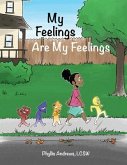Pediatric Bipolar Disorder is a neurobiological disorder that requires medical treatment. Even with successful medical treatment, however, both children and adults with bipolar disorder usually need coping skillls to manage and live with this challenging illness. The purpose of this book is to help the child with bipolar disorder better understand his or her feelings, and feel less alone in this world. This book is written for elementary school age children, but may be of use for those younger or older. Children with bipolar disorder usually have strong emotional responses to their world. The first step to treating this illness is proper medical attention. Once these children receive treatment, it is important to help them identify, understand, cope with and manage these feelings. In order to give children a sense of control over these strong feelings, a caring adult can first learn how to label their feelings. Next, guide the child to strategize appropriate responses and practice or role play the strategies. Our hope is that this book facilitates discussions with your child to help in that process. In using this book, help the child understand that feelings are an emotional response to stimulus, and it's very hard, if not impossible, to change those initial feelings. What a healthy and stable child can learn to do, however, is manage the resulting behavior and choose how much control feelings have over their lives. In other words, while it is acceptable to be angry, it is not acceptable to act destructively because of that anger. That doesn't mean, however, that an unstable child should be expected to control their illness through sheer willpower.
Hinweis: Dieser Artikel kann nur an eine deutsche Lieferadresse ausgeliefert werden.
Hinweis: Dieser Artikel kann nur an eine deutsche Lieferadresse ausgeliefert werden.








